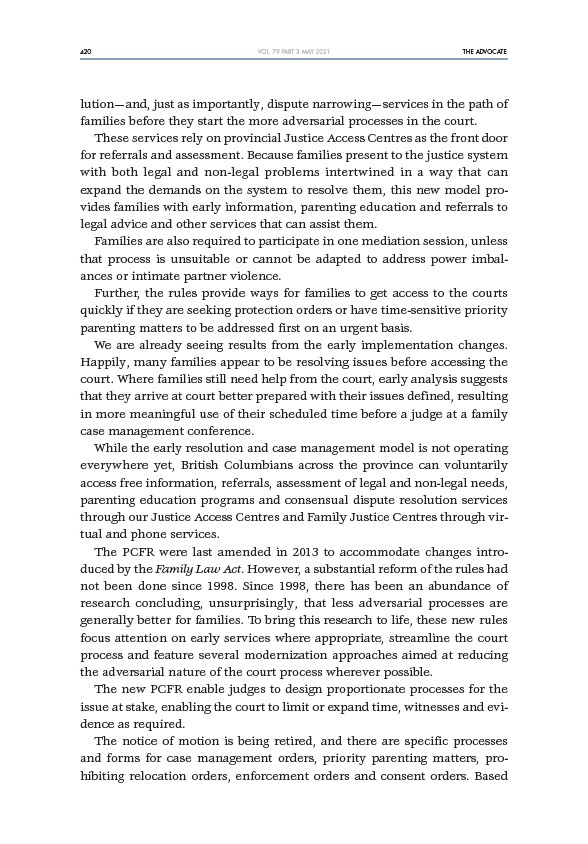
420 THE ADVOCATE
VOL. 79 PART 3 MAY 2021
lution—and, just as importantly, dispute narrowing—services in the path of
families before they start the more adversarial processes in the court.
These services rely on provincial Justice Access Centres as the front door
for referrals and assessment. Because families present to the justice system
with both legal and non-legal problems intertwined in a way that can
expand the demands on the system to resolve them, this new model provides
families with early information, parenting education and referrals to
legal advice and other services that can assist them.
Families are also required to participate in one mediation session, unless
that process is unsuitable or cannot be adapted to address power imbalances
or intimate partner violence.
Further, the rules provide ways for families to get access to the courts
quickly if they are seeking protection orders or have time-sensitive priority
parenting matters to be addressed first on an urgent basis.
We are already seeing results from the early implementation changes.
Happily, many families appear to be resolving issues before accessing the
court. Where families still need help from the court, early analysis suggests
that they arrive at court better prepared with their issues defined, resulting
in more meaningful use of their scheduled time before a judge at a family
case management conference.
While the early resolution and case management model is not operating
everywhere yet, British Columbians across the province can voluntarily
access free information, referrals, assessment of legal and non-legal needs,
parenting education programs and consensual dispute resolution services
through our Justice Access Centres and Family Justice Centres through virtual
and phone services.
The PCFR were last amended in 2013 to accommodate changes introduced
by the Family Law Act. However, a substantial reform of the rules had
not been done since 1998. Since 1998, there has been an abundance of
research concluding, unsurprisingly, that less adversarial processes are
generally better for families. To bring this research to life, these new rules
focus attention on early services where appropriate, streamline the court
process and feature several modernization approaches aimed at reducing
the adversarial nature of the court process wherever possible.
The new PCFR enable judges to design proportionate processes for the
issue at stake, enabling the court to limit or expand time, witnesses and evidence
as required.
The notice of motion is being retired, and there are specific processes
and forms for case management orders, priority parenting matters, prohibiting
relocation orders, enforcement orders and consent orders. Based